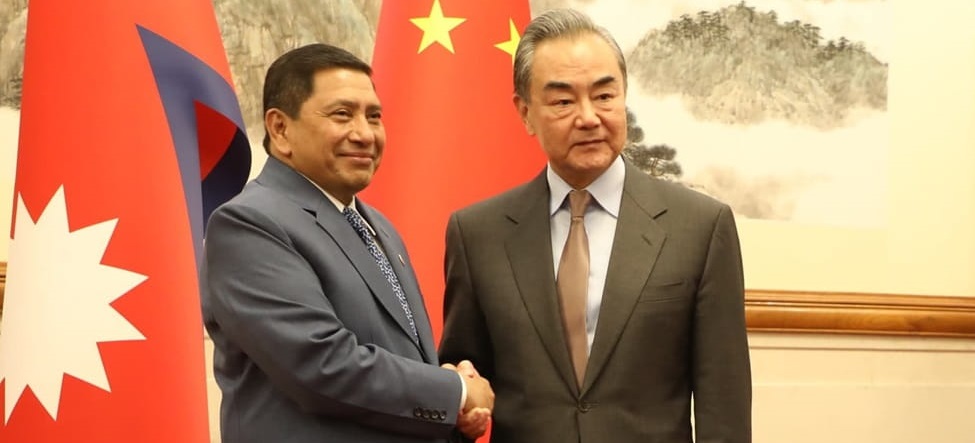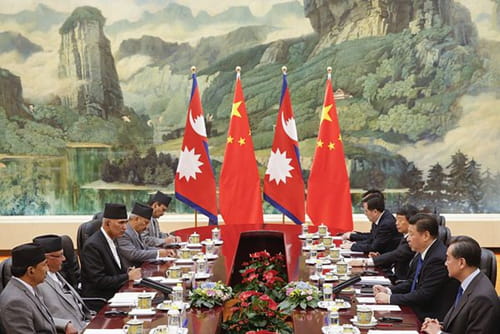
Nepal’s Foreign Minister Narayan Kaji Shrestha meets his Chinese counterpart Wang Yi in Beijing | The Annapurna Express
Over the past few years China has suggested that Nepal’s communist parties should come together to form a single powerful party and thereby a communist party-led government in Kathmandu. Nepal’s new coalition government is trying to strike a balance between India and China but the current dispensation in Kathmandu prefers to engage more with China.
Introduction
From 24 March to 1 April, 2024, Nepal’s Deputy Prime Minister and Minister for Foreign Affairs Narayan Kaji Shrestha paid an official visit to China at the invitation of his Chinese counterpart, Wang Yi. This was Shrestha’s first visit abroad after Prime Minister Pushpa Kamal Dahal changed his coalition partners in the first week of March.
No formal agreement was signed during Shrestha’s visit though there was a speculation that the two countries would sign the Belt and Road Initiative (BRI) implementation plan. During the visit the two sides discussed a wide-range of bilateral issues. On March 25, Shrestha met Wang Huning, a member of the Standing Committee of the Political Bureau of the Communist Party of China Central Committee. The readout from China’s Ministry of Foreign Affairs states that ‘China is ready to work with Nepal to faithfully implement the important consensus reached by the two countries’ leaders, [to] advance the China-Nepal strategic partnership of cooperation.’
On the same day, Shrestha held talks with Sun Haiyan, vice-minister of the International Department of the CPC Central Committee (IDCPCCC). The readout from the Chinese side states that the CPC, together with the Communist Party of Nepal (Maoist Center) is ready to strengthen inter-party exchanges, deepen mutual learning in the state governance and administration, and boost China-Nepal relations and cooperation. The Sun-led team had visited Nepal in January and held a wide-range of talks with Nepali leaders along with attending an interaction with Nepali leaders. During the visit, Sun said that some forces were trying to sabotage Nepal-China relations.
On March 26, Shrestha held talks with his counterpart Wang Yi. Wang said as a friendly neighbor and strategic partner, China has always placed Nepal in an important direction in neighbourhood diplomacy. In Tibet, Shrestha held talks with the Secretary of the Communist Party of China, Tibet Autonomous Region Wang Junzheng. The secretary had visited Nepal in November last year when he held talks with senior Nepali leaders including President Ram Chandra Poudel.
Belt and Road Initiative
Regarding the much-talked BRI implementation plan, Shrestha upon his arrival from Beijing, informed Nepal’s Parliament that the two sides had discussed providing the final touches to the document, and its early enforcement; but there is no clarity yet on what unfolds on the BRI once the implementation plan is signed.
Although China is putting all bilateral assistance to Nepal under the broader framework of the BRI, Beijing is putting pressure on Kathmandu to pick up some infrastructure projects under the BRI. After Nepal’s parliament endorsed America’s Millennium Challenge Corporation in 2022, China is applying pressure on Nepal’s political parties to make progress on the BRI as well. The BRI implementation plan was on the top agenda when Prime Minister Pushpa Kamal Dahal visited China in September last year when he assured the Chinese side that Nepal would sign after consultations with all political parties.
Regarding the BRI, there is no convergent view among the major political political parties in Nepal; communist parties seem positive about moving ahead on infrastructure projects under the BRI; but the Nepali Congress has time and again made it clear that Nepal cannot take a loan for the infrastructure projects as country’s economy cannot support it. On the loan issue, both communist and non-communist parties are on the same page: that Nepal cannot take a loan to fund big infrastructure projects. As Nepal is failing to pay back the loan of Pokhara International Airport, political leaders are cautious about taking Chinese loans. PM Dahal has publicly said that efforts are underway to convince China to convert the loan into the grants but such an outcome seems unlikely. Foreign Minister Shrestha is publicly saying that Nepal should sign the BRI implementation plan as soon as possible, but his boss PM Dahal is not in a hurry.
One new issue that figured between the two sides is about setting up a Nepal-China Joint Commission at the level of foreign ministers of both countries to oversee all bilateral issues. Nepal and India have had a similar mechanism in place since 1987 which became more active after the Bharatiya Janata Party (BJP) came to power in 2014. China is seeking similar mechanisms with Nepal.

The Diplomat
Other issues that the two sides discussed were waiving visa fees for Nepalis as Chinese nationals have been getting such facilities in Nepal since 2016. The two sides also discussed enhancing connectivity in the areas of roads, railway, air connectivity and the construction of cross-border transmission lines. According to Shrestha, the two sides also discussed bringing in more Chinese investment, technology and tourists, as well as increasing cooperation in a wide-range of other areas.
The Chinese media gave high priority to Shrestha’s visit stating that he chose China as his first foreign trip after the formation of the new coalition in Nepal. China was the first country to react after the new coalition was formed in March this year. On March 5, a day after the announcement of the new coalition, Chinese Foreign Ministry Spokesperson Mao Ning said that as a friendly neighbor and cooperation partner, China highly values its relations with Nepal. “We would like to work with the new government to uphold the five principles of peaceful co-existence, deepen friendship and advance China-Nepal strategic partnership of cooperation…” she said.
During Shrestha’s visit, both sides refrained from mentioning the Global Security Initiative (GSI) and the Global Civilizational Initiative (GCI) as there are divergent views in Nepal about those initiatives. China is requesting Nepal to sign these initiatives as soon as possible. Beijing continues to seek Nepal’s fresh commitment on the One China policy which was reflected during Shrestha’s visit as well. In the meeting with Sun Haiyan, Shrestha said Nepal’s left-wing coalition government regards China as an important partner and firmly adheres to the One China principles, and will never allow any force to use Nepal’s territory to engage in any anti-China activities. Of late, the Dahal-led government has curbed the activities of the Tibetan community in Nepal.
After the Democratic Progressive Party won the election in Taiwan’s January elections, China is seeking a fresh commitment on One China policy from Nepal. Probably, Nepal’s PM Dahal is the first South Asian leader to speak about it. While speaking in a programme organized by the Chinese Embassy on January 25, Dahal said that Nepal is against Taiwan independence. Earlier, during his official trip to China in September last year, Dahal had made a similar commitment. Over the past few years, the Chinese Communist Party (CPC) has built a good rapport with Nepal’s communist parties such as CPN-UML, CPN (Maoist Center) and other fringe communist parties through exchanges and visits. At the same time, China wants the Nepal Government to sign two vital treaties: the Treaty on Mutual Legal Assistance and the Extradition Treaty.
Over the past few years China has suggested that Nepal’s communist parties should come together to form a single powerful party and thereby a communist party-led government in Kathmandu. Nepal’s new coalition government is trying to strike a balance between India and China but the current dispensation in Kathmandu prefers to engage more with China.
In its Common Minimum Programme (CMP), the five-party ruling coalition has pledged to adopt an independent and non-aligned foreign policy based on the UN Charter, Panchsheel, values of world peace and Nepal’s international commitments. The present government is dominated by the communist parties with the presence of other two parties such as Rastriya Swatantra Party and Janata Samajbadi Party Nepal. However, whichever party forms the government in Kathmandu, China is expanding cooperation with Nepal in new and multiple areas.
(Exclusive to NatStrat)